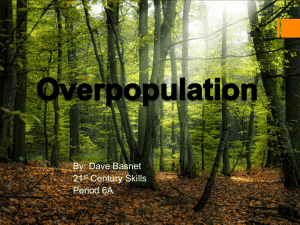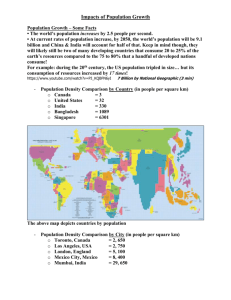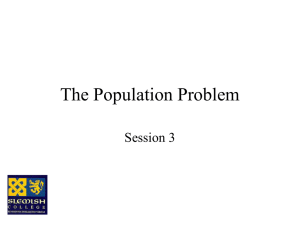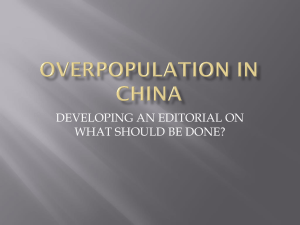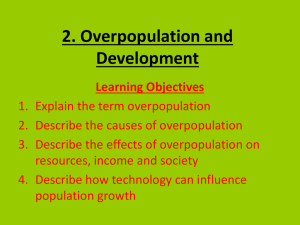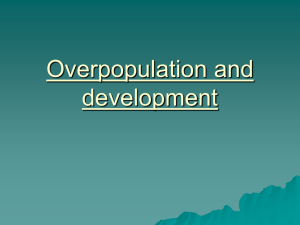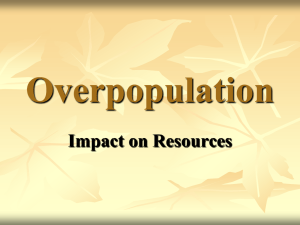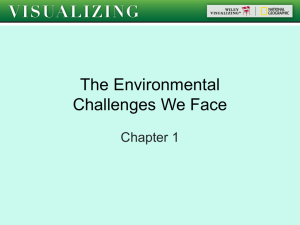ExamTutorials.Com-SEC-450-Week-4-Population
advertisement
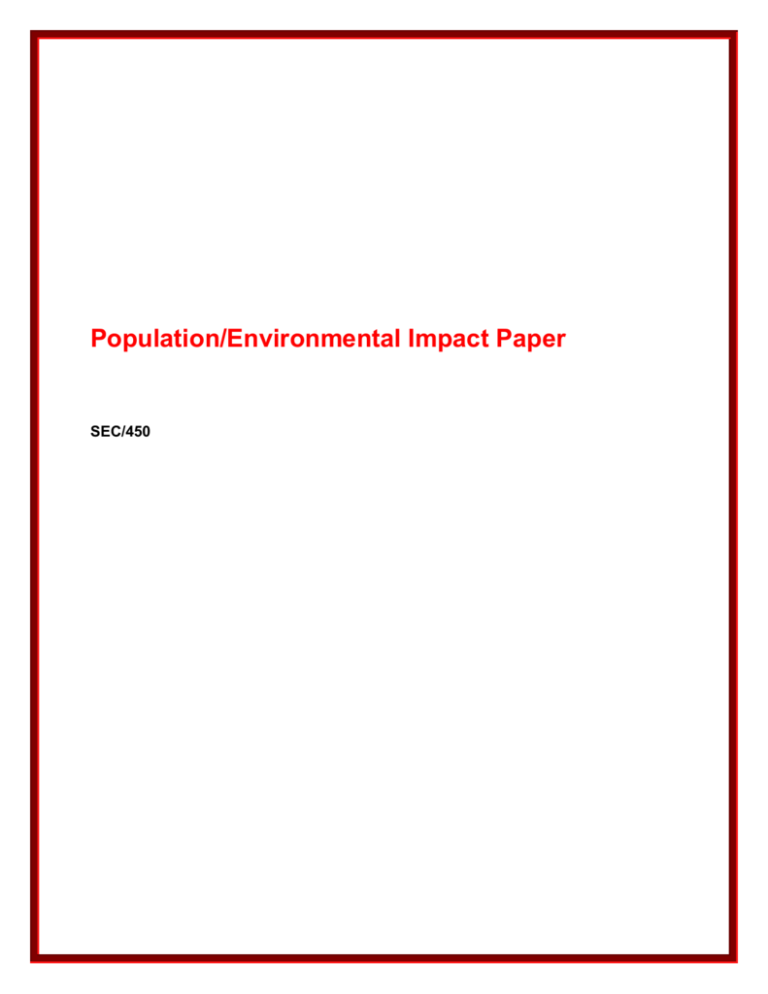
Population/Environmental Impact Paper SEC/450 Population/Environmental Impact Paper In the start, the entire world was without shape and empty. Researchers, Theologians, Evolutionist, and others have their own hypothesis regarding how life started for example who was here first, and the way mankind developed. Since the beginning of time individuals have procreated and although the earth has not reduced in size, it has become smaller due to overpopulation. Science Daily (2009) mentioned in an article Worst Environmental Problem? Overpopulation, Experts State, “Overpopulation is the world’s main ecological problem, followed closely by global warming and the requirement to create renewable energy sources to substitute fossil fuels, as per a survey of the faculty at the SUNY College of Environmental Science and Forestry” (p. 1). Overpopulation of communities, neighborhoods, towns, countries, states, and nations isn't just a regional problem but also a global and international problem. When the human population increases all over the world there's an exhaustion of natural sources, land, food, and ecological problems increase to the detriment of everybody. A detailed study of China, India, and the United States the nations with the highest populations throughout the world will demonstrate the effect of overpopulation, how bordering nations are impacted, the problems they encounter, and the effect of international ecological plan linked with these problems. Excessive Population A fact sheet released by the University of South Dakota (2011) on increased human population states “To put it simply, the entire world can just support so many people with the sources which are available. These limited sources incorporate fresh water, fossil fuels, and foodstuff which the earth provides. Nobody knows precisely what the holding capability of the planet is; but, there are a specific number of individuals who are able to survive on this planet. It's not advisable to arrive at this stage, when our sources restrict us to a point where expansion is not possible. To avert this scenario there's a requirement to start working to reduce human population growth rates in each and every nation all over the world. It's particularly important, though, to restrict those growth rates in nations in which they are highest and also have the greatest possibility to reach these undesired limitations” ( p. 1). China As per the National Bureau of Statistics China has got a human population of 1.37 billion. China’s population stands for 20% of the world’s human population that's equivalent to declaring one out of every 5 people lives in China. Zhang Weiqing, minister responsible for the National Population and Family Planning Commission in China (2004) said at a forum held at Beijing University that “China's increasingly growing human population will create serious pressure and effect on the nation's sources and atmosphere in forthcoming years, adding that the country's human population is nearing its sources capacity limit” (p. 1). Zhang also stresses “other population-related issues, stating that the fertility rate is not stable, the overall population quality is lower, employment encounters massive pressure and the public health system is bad” (p. 1). China also has a lot more senior citizen population which will require health care and housing which adds a pressure on the Chinese economy. The overpopulation of China is resulting in the requirement for additional schools, health services, along with other essential human services which people rely on. China’s overpopulation can be helpful to other nations due to their migration to other countries all over the world. The overpopulation problems also have a good impact on the marketplace and trade since the labor cost has reduced due to rivalry and the pool of available employees. India India has got a human population of 1.2 billion and several state that the population increase has benefited the nation. India’s economy is somewhat thriving since education among teenagers and adults has enabled them to remain competitive in the marketplace and get job. The high rates of jobs have enabled the nation to enhance production in farming and industry. The government of India acknowledges the impact of the human population increase and has taken measures by making policy to improve the education system and create possibilities for job, business, and the economic climate. Rohan Kothare (1999) mentioned in his writing of “Does India’s Population Growth has a Positive Effect on Economic Growth? “India has become one of the world’s quickest growing economies, mainly because of the increase in population growth creating a good impact on its long term economic growth. India is currently rated among the leading suppliers in agriculture and is a leading country in terms of GDP in a developing country. Most of the time, economists are right in stating that human population growth has got a good impact on economical expansion of a country. The truth is, economic experts may say, "If it weren’t because of its high populations India would still be a struggling developing country" (p. 13). Even though economy might be better off due to the high employment rate, enhanced production, and policies which encourage the citizenry to get benefit of the education system, the nation is still plagued with malnutrition, and poverty. United States The United States is presently the 3rd largest populated nation on the planet with roughly 350 million people. Just like other overpopulated nations the weaknesses, risks, and dangers of overpopulation are reduction in natural sources, food, high joblessness, housing problems, waste control, an ageing infrastructure, and the increase for social services. Craig Huneke (2011) says “The impacts the United States stunning population increase are many, some others incorporate: places which at one time might be loved for their natural splendor are currently concrete jungles, our country's kids attend schools which are crammed and don't have the teacher to student ratio once had, social infrastructures and systems are crammed, natural sources are being exhausted, and our atmosphere is being tasked above its limitations” (p. 1). One of the leading problems the United States is encountering is the exurbanite quantity of oil, gas, and food the nation uses. Because the number of individuals rises in the United States the more vulnerable the nation is to become dependent upon other nations. Environmental Policies Related to Overpopulation Excessive overpopulation generates difficulties for nations and countries which should be dealt with to guarantee the country’s capability support the growth. Some nations such as China and Japan have implemented restrictions on the quantity of kids a household might have. The United States doesn't restrict family sizes nevertheless the local and federal government has implemented an aggressive family planning and education plans. Government which have identified an increasing human population are inclined to prepare for the progress by assigning dollars and resources for bigger schools, hiring more teachers, improving the physical, and social infrastructure as well as offers measures to save energy, providing educational and career training programs, set up, and apply rigid immigration plans and practices. Ecological policies associated with overpopulation also include contamination, global warming, deforestation, urbanization, and industrialization. These problems should be dealt with by means of creating laws, rules, guidelines, and standards which will work for the good of the country, the folks, as well as the bordering nations. Searching for substitute fuels sources, safe techniques to generate goods, improve bulk transportation, control the exploitation of natural sources, deal with unhygienic conditions, and create latest and creative methods to help the population in their day-to- day life-styles. Lastly, because the population rises as well as the living conditions are strained due to hunger, joblessness, homelessness, and overcrowding offense becomes more related. The government has got a duty to safeguard and serve; for that reason dollars should be available to fight crime, and narcotics. Africa’s Natural Resources Africa with oil, gas, wood, diamonds, gold, cotton, and bauxite is home to a few of the biggest deposits of natural sources all over the world. Mandy Turner (2007) writes in an article Scramble for Africa that “The 19th-century scramble for Africa witnessed the truly amazing powers dash to manage land so that they could exploit natural sources. These days, there's a new struggle for Africa happening, and the region has once again become an important market of strategic and geopolitical rivalry between the US, France, Britain, China and India.” He continues stating “Oil is probably the most crucial attraction, with rivalry between overseas countries and firms to acquire resources so intense it allures a lot more than 50% of all foreign direct investment” (p. 1). Africa has got the sources which several overpopulated nations require and for that reason Africa is in a situation to assist the whole world however hopefully not to their own detriment. In conclusion, overpopulation or high human population is a problem which is a regional as well as global risk to society. China, India, and the United States are nations susceptible to the risks of overpopulation. The dangers incorporate exhaustion of the country’s natural sources, housing deficiency, global warming, and food deficiency, devastation of physical and social facilities, poverty, and poor health services. India appears to cope with the human population increase in stride, benefiting from technology, education, and output increases in farming and industry. Other nations nevertheless haven't been so lucky, and they are suffering from the aforementioned issues that happen with overpopulation. Ecological plans set up by governments perform a crucial role in dealing with overpopulation. India has advanced and flourished during their developing period due to their plans on education as well as training. The Unites States does not have any plan on overpopulation however they do have an aggressive family services as well as education plan. The danger of overpopulation has opened the doorway to Africa as becoming a messiah to these nations. Like a step to equalize the overpopulation problem China, India, and the United States turn to Africa’s natural sources like a potential possibility.
